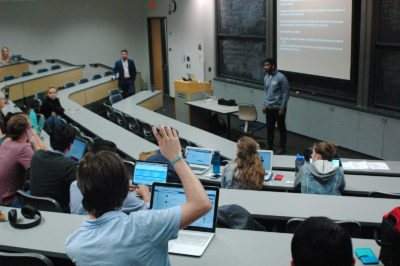
Boston University Student Government concluded a weeklong election Friday to elect 10 “at-large” senators after voting last May to abolish the seven seats allotted to student groups. The results will be announced later this week before SG’s first meeting on Monday, according to Executive Vice President Piergiacomo Cacciamani.
The former seats — which were reserved for senators from Environment Student Organization, BU Hillel, InterFraternity Council, Panhellenic Council and the Student-Athlete Advisory Committee — will be replaced with 10 seats for which any student could run. Cacciamani said these new seats should allow for a wider variety of students to have voices in Senate.
“The problem [with the old system], for example, was that ethnic minorities or particular student organizations wouldn’t be represented in Senate,” he said. “Now, with these 10 at-large seats, that’s not an issue anymore.”
As part of a larger effort to implement equal representation of all students in Senate, May’s vote not only replaced the student groups’ seats but also increased Senate seats for all colleges — effectively doubling the total seats.
Former College of Fine Arts Sen. Daniel Collins — who voted in favor of the new structure last semester — wrote the main drive for the proposal’s passing was the “one student, one vote” philosophy. Even though the vote stripped some student groups of representation, the at-large system gives them the opportunity to earn it back.
“The ten at-large seats are meant to address the loss of representation which these student groups would face, while providing new opportunities to those groups which, primarily for historical reasons, did not already have seats,” Collins wrote in an email.
This election consisted of 17 candidates who represented a wide array of student groups including LGBT issues, BU’s Panhellenic Council, BU Hillel and campus art publications, College of Engineering Sen. Nehemiah Dureus wrote in an email.
One of the candidates, Alessia Riccio, said she hoped to give her fellow students insight into university decisions by participating in them herself.
“I decided to run because I thought it would be a good way to get involved with the university’s decisions,” the College of Communication senior said. “By better educating myself on current happenings, I believe I could also educate fellow students.”
While Riccio seeks to represent students from across campus, another candidate, Hodan Hashi, ran to represent cultural groups and the freshman class specifically. Hashi said she liked the new system’s flexibility, which allows candidates to choose what interests they would like to represent.
“Now, the only people voting for you aren’t the ones that know you, but [instead] ones who share similar beliefs as you,” the sophomore in the College of Arts and Sciences said. “I think this gives more power to the voters, as well as allowing the senate to represent a wider variety of people.”
Though the new system elicited praise from some, other said that in practice, they were skeptical it would accomplish what it intended to do in providing equal representation to all students.
For instance, a disproportionate number of candidates are freshmen, Dureus — who voted for the new system last year, but is no longer a senator — wrote.
He wrote that while he admires the spirit of first-year participants in the SG elections, he is concerned some candidates were not specific about what they sought to represent, which could undermine the whole purpose of the new policy.
“A few seemed to imply that they would represent all of BU, which wouldn’t make sense given that that’s the job of Senate as a whole and executive board,” Dureus wrote. “With vague or double representation, we could very well run into significant issues that could bring into question how the student body is represented in Senate.”
Still, the candidates who ran on specific platforms indicates the potential success of the at-large system, he added.
“Some candidates ran to represent LGBTQ+ issues, The Panhellenic Council, Hillel, Campus Art publications and more,” Dureus wrote. “Seats that represent specific ideas and have organizations that they can report back to will, in my opinion, allow this new system reach its full potential, regardless if the person holding the seat is a freshman or not.”
Some BU students expressed ambivalent feelings on the Senate’s new seating structure, though many weren’t aware that the elections were taking place.
CAS student Teferi Tadesse, who voted in the election, said he thinks it’s too early to judge whether or not the new system will be an effective means to represent the student body.
“It’s a good way to include everybody in student government, but I think we have to wait and see,” the freshman said. “There could be more students from a certain college or from a certain area, and maybe other students might not be as represented.”
Xin Li, a first-year graduate student in ENG, said he thinks the new system can ensure the best representatives are chosen.
“Diversity is not as much of a priority as selecting the best people from the community,” Li said. “I think [students] should be more open to vote not only based on diversity but also consider more the capabilities of each candidate.”
Ashley Wang, a freshman in the Questrom School of Business, said she approves of Senate’s new seating system.
“It’s a good idea because [Senate] is supposed to be representative of the student body,” Wang said. “If the whole student body can run, it’s more inclusive.”
CORRECTION: A previous version of this article stated that Nehemiah Dureus is a former senator. It has been updated to reflect that he is an active senator.
Shaun was the Editor-in-Chief for the Spring 2019 semester. Before that, he was the Multimedia Editor, the Layout Editor and a News writer. He also sat on the Board of Directors. Follow him on Twitter @shaun_robs.




